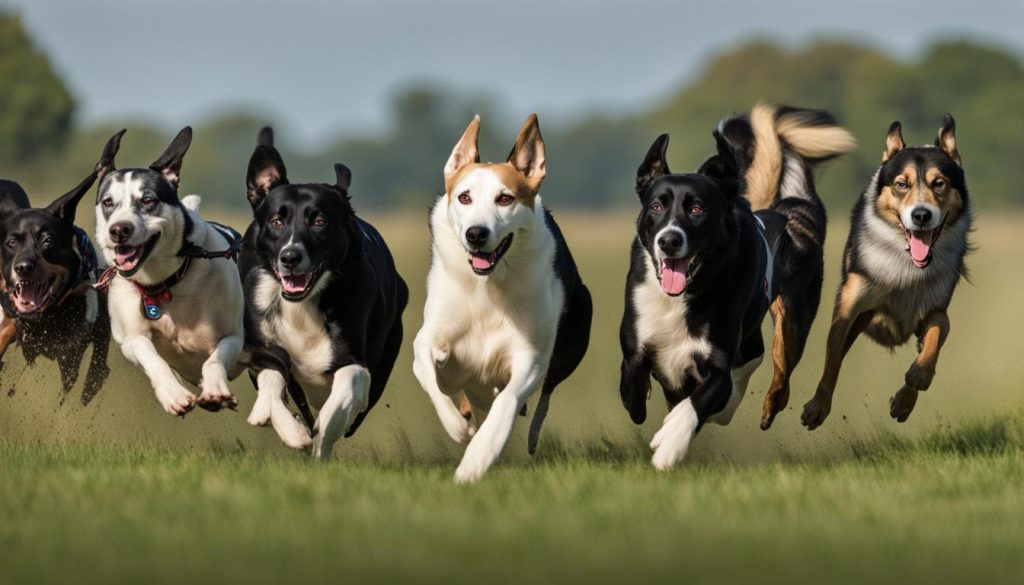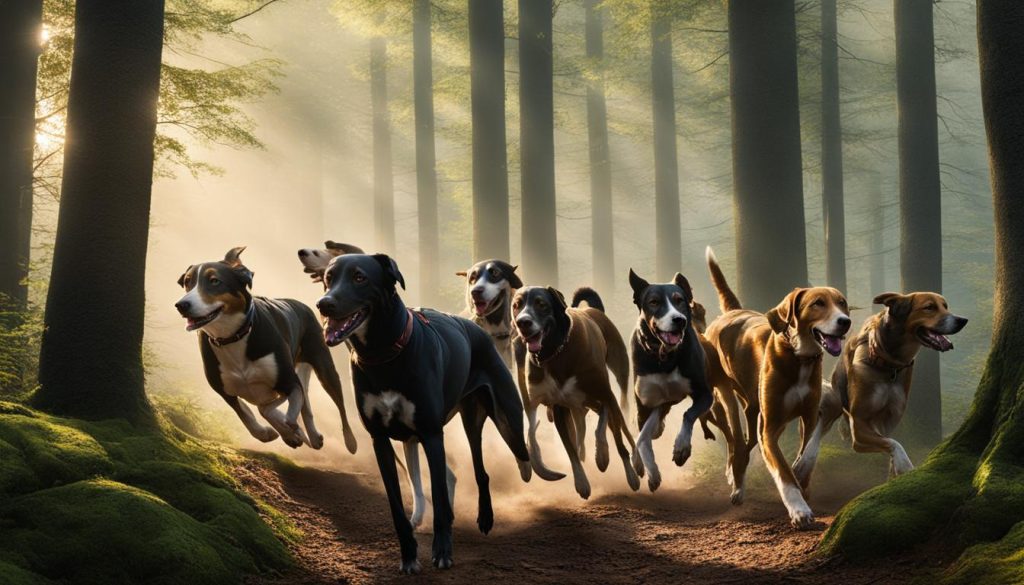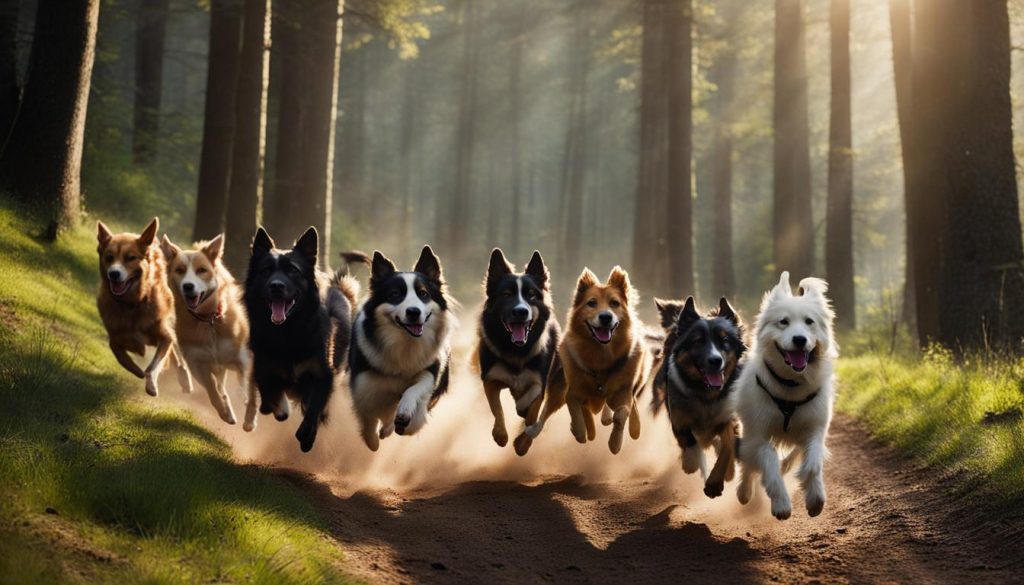Running can be a fantastic way for dogs to stay active and bond with their owners. However, not all dog breeds are well-suited for running. Factors such as endurance, obedience, and athleticism play a crucial role in determining a dog’s suitability for running.
In this guide, I will provide you with a list of dog breeds that are known to be great running partners. Whether you’re an avid runner or just starting out, finding the right dog breed can make your running experience more enjoyable and fulfilling. But remember, always consult with your veterinarian before starting any exercise program with your dog to ensure their safety and well-being.
Key Takeaways:
- Choose a dog breed that matches your running style and preferences.
- Consider factors like energy level, endurance, and weather tolerance when selecting a running companion.
- Consult with your veterinarian to assess your dog’s fitness level and determine the appropriate running routine.
- Gradually increase the distance and intensity of your runs to avoid overexertion.
- Practice good running etiquette and always clean up after your dog during bathroom breaks.
Factors to Consider Before Running with Your Dog
Before you start running with your dog, there are several factors to consider to ensure their safety and well-being. I recommend that you take into account your dog’s age, as young puppies should not be taken for a run until their bones and joints are fully developed. Medium-to-large breed dogs should avoid running on hard surfaces until they are at least 18 months old to prevent potential joint or bone issues.
For senior dogs, please assess their fitness level and consult with your veterinarian for advice on appropriate distances and modifications. Just like humans, dogs may experience age-related issues that can affect their running abilities. By evaluating their overall health, you can make adjustments as necessary to accommodate their needs and prevent any discomfort.
During your runs, listen to your dog and pay attention to their signals. If they seem tired or have difficulty keeping up, it may be necessary to adjust the pace or distance. Additionally, always keep safety in mind by ensuring your dog is wearing a secure collar or harness and using a leash designed for running. This will provide you with better control and prevent any accidents or escapes.
Best Dog Breeds for High-Energy Running
When it comes to high-energy running, certain dog breeds stand out for their athleticism and endurance. These breeds are known for their energy levels and can keep up with a fast-paced runner. If you’re an active individual looking for a running partner that can match your energy, consider one of these breeds:
- Weimaraner
- Dalmatian
- Vizsla
- German Shorthaired Pointer
These breeds have the qualities necessary for high-energy running. They have the stamina to endure longer distances and the athleticism to handle the physical demands of running. These dogs thrive when given the opportunity to burn off their energy through vigorous exercise.
If you’re looking for a running companion that can keep up with your active lifestyle, consider one of these high-energy breeds. They will not only provide you with excellent company but also help motivate you to push your limits during your runs.

Best Dog Breeds for Long Distance Running
When it comes to long distance running, not all dog breeds are created equal. Some breeds have the stamina and endurance to cover longer distances, making them ideal companions for marathon runners or those who enjoy extended runs. If you’re looking for a dog breed that can keep up with your long distance running goals, consider the following breeds:
Rhodesian Ridgeback
The Rhodesian Ridgeback is known for its exceptional endurance and resilience. Originally bred for hunting lions, this breed has a strong and muscular build that allows them to cover long distances with ease. Their natural running gait and powerful stride make them excellent partners for long runs. Additionally, their short coat makes them well-suited for running in warmer climates.
English Springer Spaniel
The English Springer Spaniel is a highly energetic and athletic breed that thrives on physical activity. They have a medium build and an enthusiastic nature, which makes them well-suited for long distance running. Their endurance and agility allow them to maintain a steady pace over extended periods of time, making them ideal companions for runners who enjoy covering longer distances.
Belgian Malinois
The Belgian Malinois is an intelligent and versatile breed that excels in various sports and activities, including long distance running. Known for their exceptional athleticism, these dogs have the stamina and drive to run for miles. With their strong work ethic and endurance, they make excellent companions for marathon runners or those who enjoy endurance running. Their short coat also makes them well-suited for running in various weather conditions.
If you’re considering a long distance running partner, keep in mind that each dog is unique and has individual needs and abilities. I recommend that you consult with breeders, trainers, or animal shelters to find the right dog breed for your specific running goals and lifestyle. And always remember to prioritize the health, safety, and well-being of your furry companion throughout your running journey.

Best Dog Breeds for Running in Warmer Climates
Running in warmer climates requires careful consideration of the dog breed’s ability to handle heat and still enjoy physical activity. Not all breeds are well-suited for higher temperatures, as some may be more sensitive to heat-related issues. If you live in a warmer climate and enjoy running, consider these dog breeds that are known to handle the heat well and thrive in warm weather conditions.

Dog Breeds for Running in Hot Weather
1. Vizsla: These sleek-coated dogs are highly energetic and make excellent running partners. They have a high tolerance for heat and can handle running in warm weather conditions.
2. Weimaraner: With their short, smooth coats, Weimaraners are well-suited for warm climates. They have high energy levels and can comfortably run in hotter temperatures.
3. Rhodesian Ridgeback: These athletic dogs have a dense and short coat that protects them from the sun. They are built for endurance and can handle running in warmer climates without overheating.
| Breed | Description |
|---|---|
| Vizsla | Highly energetic breed with a sleek coat that tolerates heat well. |
| Weimaraner | Well-suited for warm climates with high energy levels and a short coat. |
| Rhodesian Ridgeback | Athletic breed with a dense and short coat, built for endurance running in warmer climates. |
Running with these breeds in warmer climates requires monitoring their energy levels and providing frequent water and rest breaks to prevent overheating. Always prioritize your dog’s well-being and adjust the intensity and duration of your runs accordingly. Consult with your veterinarian for personalized guidance on running in hot weather.
These dog breeds have the physical characteristics and endurance to handle running in warmer climates. However, please be mindful of your dog’s individual needs and limitations. Keep a close eye on their behavior and watch for any signs of overheating or distress during your runs. By choosing an appropriate breed and taking the necessary precautions, you and your four-legged companion can enjoy running together, even in hot weather.
Best Dog Breeds for Running in Cold Climates
When it comes to running in cold climates, certain dog breeds are better equipped to handle the chilly temperatures. These breeds have thick coats and a natural tolerance for colder weather, allowing them to enjoy outdoor activities even in winter. If you’re a cold weather enthusiast and looking for a running companion, consider the following dog breeds:
Russian Siberian Husky
The Siberian Husky is a breed known for its ability to thrive in cold climates. With a double coat and a dense undercoat, they are well-insulated against low temperatures. These dogs have a high level of endurance and love to run, making them perfect for long-distance winter runs. Their friendly and energetic nature also makes them great companions for outdoor adventures.
Alaskan Malamute
The Alaskan Malamute is another breed that excels in cold climates. These dogs have a thick, waterproof coat that keeps them warm and protected from the elements. They are incredibly strong and can pull heavy loads, making them ideal for winter running and activities like skijoring. Alaskan Malamutes are loyal and friendly dogs, making them great running companions.
Samoyed
The Samoyed is a breed known for its beautiful white coat and friendly personality. These dogs have a thick and fluffy double coat that provides excellent insulation in cold weather. Samoyeds are highly adaptable and can handle running in various conditions, including snowy landscapes. They are loyal, gentle, and love being active, making them excellent running partners.

When running with your dog in cold climates, take precautions to ensure their safety and well-being. Here are some tips:
- Protect their paws: Consider using booties to protect your dog’s paws from cold surfaces and salt used on roads and sidewalks.
- Monitor their body temperature: Keep an eye on your dog’s body temperature and watch for signs of discomfort or hypothermia. Consider using a doggy jacket or sweater for added warmth.
- Stay hydrated: Even in cold weather, dogs can become dehydrated. Make sure to bring water and offer frequent breaks for your dog to drink.
- Adjust your running routine: Be mindful of the weather conditions and adjust your running routine accordingly. Avoid running in extreme cold or during snowstorms.
By choosing the right dog breed and taking necessary precautions, you can enjoy your runs together even in the coldest of climates. Running in winter can be a fun and invigorating experience for both you and your furry friend.
Best Dog Breeds for Trail Running
Trail running is an exciting and challenging activity that requires a dog with agility and adaptability. Certain dog breeds are well-suited for off-road trails and can handle the rough terrains with ease. These breeds have the athleticism and endurance to keep up with your pace and enjoy the adventure of trail running.
Highly Recommended Breeds for Trail Running
1. Weimaraner
2. Vizsla
3. Dalmatian
The Weimaraner, Vizsla, and Dalmatian are known for their excellent navigational skills and ability to handle challenging terrains. With their high energy levels and endurance, they make great running companions for off-road trails. These breeds thrive when given the opportunity to explore and exert their energy in a natural environment.
Whether you’re tackling steep inclines or winding paths, these trail running dogs will keep up the pace and make your off-road adventures even more enjoyable.
| Breed | Athleticism | Endurance | Agility |
|---|---|---|---|
| Weimaraner | High | High | High |
| Vizsla | High | High | High |
| Dalmatian | High | High | High |

These breeds are not only physically capable but also intelligent and trainable. Their natural instincts and instincts make them adaptable to various trail conditions. They enjoy the challenge of navigating rough terrains and will make your trail running experience even more rewarding.
Before hitting the trails, make sure to properly train and condition your dog. Gradually increase the distance and difficulty of the trails to avoid injuries. Always prioritize your dog’s safety by monitoring their energy levels and providing sufficient water breaks. Together, you and your four-legged companion can conquer any trail and create unforgettable memories.
Note: While these breeds are highly recommended for trail running, always consider your individual dog’s health, fitness level, and any specific needs or limitations they may have.
Best Dog Breeds for Running with Beginners
When it comes to running, finding the right canine companion is essential, especially for beginners. Certain dog breeds are known for their friendly and adaptable nature, making them ideal running partners for novice runners. If you’re just starting your running journey, consider these beginner-friendly dog breeds:
- Labrador Retriever: Known for their friendly and outgoing personalities, Labradors are well-suited for running. They have high energy levels and can keep up with your pace.
- Beagle: Beagles are small to medium-sized dogs that love to run and explore. They are adaptable and can easily adjust to different terrains and distances.
- Jack Russell Terrier: Despite their small size, Jack Russell Terriers have boundless energy and make excellent running partners. They are agile and can handle shorter distances and brisk walks.
These breeds not only provide companionship but also motivation during your runs. They enjoy regular exercise and can help you stay motivated and committed to your running routine. Try to start slowly and gradually increase your distance to prevent any injuries to both you and your dog.

Before you begin running with your dog, consult with your veterinarian to ensure your dog is healthy and ready for exercise. Your vet can provide guidance on the appropriate running routine for your dog’s age, breed, and fitness level. Additionally, please listen to your dog’s cues and adjust your pace and distance accordingly. Proper hydration, rest breaks, and running in suitable weather conditions are also essential for your dog’s well-being.
Benefits of Running with Beginner-Friendly Dog Breeds
Running with beginner-friendly dog breeds offers several benefits. Firstly, these breeds are typically easy to train, making the running experience more enjoyable and efficient. They are quick to learn commands and can adapt to different running styles and techniques. Additionally, these breeds thrive on regular exercise, which helps maintain their overall health and prevents behavioral issues that may arise from pent-up energy.
Running with a friendly and energetic dog breed not only enhances your physical well-being but also strengthens the bond between you and your furry companion. It’s a win-win situation that can improve both your health and your dog’s happiness.
Try to always prioritize the safety and comfort of both you and your dog while running. Pay attention to any signs of fatigue or injury and make adjustments as necessary. With the right breed by your side, running can become a fulfilling and rewarding experience for both you and your four-legged friend.
Mixed Breeds and Shelter Dogs as Running Companions
Running with mixed breed dogs and shelter dogs can be a rewarding and fulfilling experience. These dogs not only make wonderful companions, but they also offer the opportunity to give a loving home to a deserving pet. Many mixed breed dogs found in shelters have the qualities needed for running, and their individual characteristics can make them unique and excellent running partners.
When considering running with a mixed breed or shelter dog, assess their energy levels, temperament, and overall health. While certain breeds might be known for their athleticism or endurance, mixed breed dogs can surprise you with their agility and adaptability. Additionally, shelter dogs often have a strong desire to please their owners, making them eager and motivated running companions.
Running with a mixed breed or shelter dog is not just about finding the perfect running partner; it’s also about providing a second chance and a loving home to a dog in need.
Before embarking on a running routine with a mixed breed or shelter dog, I would advise that you establish a strong bond and trust through training and socialization. Gradually introduce them to running by starting with short distances and gradually increasing the intensity and duration. I recommend that you listen to your dog’s cues and adjust the pace and distance accordingly.
| Breed | Traits | Running Compatibility |
|---|---|---|
| Mixed Breed 1 | Energetic, Agile, Good Temperament | Excellent |
| Mixed Breed 2 | High Stamina, Trainable, Friendly | Great |
| Mixed Breed 3 | Adaptable, Medium Energy, Intelligent | Good |
Visiting local animal shelters and rescue organizations is a great way to find a mixed breed or shelter dog that suits your running needs. These organizations can provide valuable information on the dog’s background, temperament, and energy levels. By adopting a mixed breed or shelter dog as your running companion, you not only enrich your own life but also give a deserving dog a second chance at a loving and active lifestyle.

Tips for Running with Your Dog
Running with your dog can be a rewarding and enjoyable experience, but take the necessary precautions to ensure the safety and well-being of both you and your furry companion. Here are some tips to help you have a successful and safe run:
- Start Slow: Just like humans, dogs need time to build up their endurance. Begin with shorter runs and gradually increase the distance and intensity over time. This will help prevent injuries and allow your dog to adapt to the running routine.
- Use Proper Gear: Invest in a hands-free leash or a leash specifically designed for running. These types of leashes allow you to have more control while keeping your hands free to maintain your running form. Additionally, make sure your dog is wearing a properly fitted collar or harness.
- Hydration is Key: Always bring water for both you and your dog during your runs, especially in hot weather. Dogs can quickly overheat, so offer them water throughout your run and take frequent breaks to rest and hydrate.
- Stick to Safe Routes: Choose running routes that are safe and free from potential hazards. Avoid busy streets with heavy traffic and opt for parks, trails, or designated running paths whenever possible. Be cautious of extreme weather conditions and adjust your running plans accordingly.
- Practice Good Etiquette: Clean up after your dog during bathroom breaks by carrying waste bags with you. Be mindful of others on the trail or path by keeping your dog under control and respecting their space. Always follow any local regulations or rules regarding running with your dog.
To put it simply, running with your dog is a partnership, and pay attention to their cues and well-being. Monitor your dog’s behavior, breathing, and energy levels during your runs. If you notice any signs of fatigue, discomfort, or distress, stop running and seek veterinary assistance if necessary. With proper training, preparation, and care, you and your dog can enjoy many miles of running together.

“Running with your dog is not just a physical activity, but also a bonding experience. It’s a time for both of you to enjoy the outdoors, exercise, and strengthen your connection. Take the time to listen to your dog’s needs and adjust your running routine accordingly. Whether it’s a slower pace or shorter distances, remember that the goal is to have fun and spend quality time together.”
Final Thoughts
After considering various factors such as energy level, endurance, weather tolerance, and agility, choosing the right dog breed for running is a personal decision. Each dog breed has its own unique qualities that may or may not align with your running preferences. I recommend that you remember that what works for one dog may not work for another.
Regular communication with your veterinarian is crucial in determining if your dog is physically capable of running and to ensure their safety and well-being. Additionally, providing proper training and gradually increasing the distance and intensity of your runs will help both you and your dog enjoy a safe and enjoyable running experience.
Whether you decide to adopt a purebred dog, a mixed breed, or a shelter dog, your running companion will undoubtedly bring joy, motivation, and companionship on the road. Running with a dog is not only a great way to stay active but also an opportunity to strengthen the bond between you and your four-legged friend. So, choose the right running dog for your needs, consult with professionals, and embark on an adventure filled with health benefits and shared experiences.
FAQ
What factors should I consider before running with my dog?
Before running with your dog, consider factors such as your dog’s age, fitness level, and any health conditions. I recommend that you consult with your veterinarian for advice specific to your dog.
What is the ideal age for a dog to start running?
Puppies should not be taken for a run until their bones and joints are fully developed. Medium-to-large breed dogs should avoid running on hard surfaces until they are at least 18 months old.
Can senior dogs go running?
Senior dogs can still go running, but their fitness level and health should be assessed by a veterinarian. I recommend that you make appropriate modifications and monitor their energy levels and comfort during runs.
What dog breeds are good for high-energy running?
Breeds like the Weimaraner, Dalmatian, Vizsla, and German Shorthaired Pointer have high energy levels and endurance, making them excellent running partners.
Which dog breeds are best for long distance running?
Breeds like the Rhodesian Ridgeback, English Springer Spaniel, and Belgian Malinois have the stamina and endurance to cover longer distances.
Can certain dog breeds tolerate running in warmer climates?
Breeds like the Vizsla and Weimaraner have sleek coats and can tolerate running in warmer temperatures. However, monitor their energy levels and provide them with water and rest breaks to prevent overheating.
Which dog breeds are well-suited for running in cold climates?
Breeds like the Malamute, German Shepherd, and Swiss Mountain Dog have thick coats and are well-suited for running in colder temperatures. They have a stocky build and insulating fur to help them stay warm.
What dog breeds excel in trail running?
Breeds like the Weimaraner, Vizsla, and Dalmatian have the athleticism and endurance to handle the challenges of trail running. They are known for their ability to navigate rough terrains.
Which dog breeds are good for running with beginners?
Breeds like the Labrador Retriever, Beagle, and Jack Russell Terrier are friendly, adaptable, and easy to train. They can keep up with beginners’ pace and provide motivation and companionship during runs.
Can mixed breeds and shelter dogs be good running companions?
Yes, many mixed breeds and shelter dogs have the qualities needed for running. Their individual characteristics can make them unique and wonderful companions on the road. Consider visiting local animal shelters and rescue organizations to find a mixed breed dog that suits your running needs.
What are some tips for running with my dog?
Start by easing your dog into a running routine and gradually increasing the distance and intensity. Use a hands-free leash or a leash specifically designed for running to ensure freedom of movement. Always bring water and take breaks during the run, especially in hot weather. Practice good running etiquette and clean up after your dog during bathroom breaks.






